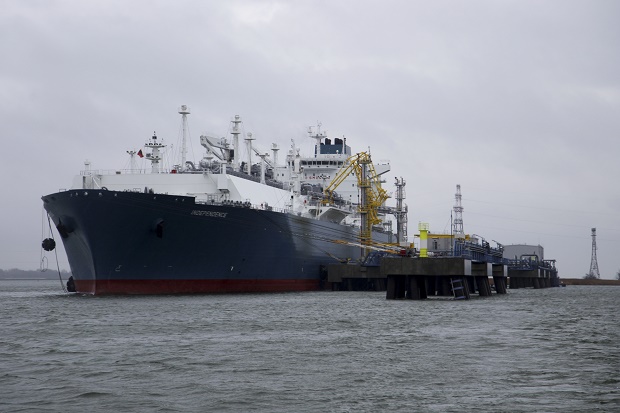
In this photo taken Wednesday, Nov. 18, 2015, floating storage and regasification unit Independence is anchored off the shore of Klaipeda, Lithuania. Since last year, a floating gas terminal called Independence has protected thousands of Lithuanians from the risk of sudden cutoffs in gas supplies from Russia, a regional heavyweight that has long used its near monopoly on energy in Eastern Europe as a political weapon. AP Photo
KLAIPEDA, Lithuania—Andrius Petraitis watches the flickering blue flame on his cooker and sighs with relief. This winter, he won’t have to worry about supplies of gas for heating or cooking.
Since last year, a floating gas terminal called Independence has protected thousands of Lithuanians from the risk of sudden cutoffs in gas supplies from Russia, a regional heavyweight that has long used its near monopoly on energy in Eastern Europe as a political weapon.
“This terminal has brought a strong sense of self-confidence,” said Petraitis, a 34-year-old logistics manager who is married with a 9-month old daughter.
The terminal for liquefied natural gas, which is the size of an aircraft carrier, is docked off the this coastal city, some 300 kilometers (190 miles) west of the capital, Vilnius. Because the liquefied gas can be transported by ship, Lithuania can bring in gas from any number of countries around the world.
“It’s like a symbol of our free will to make our own decisions. It adds to the feeling that our country is stronger and more self-reliant now,” said Petraitis.
Lithuania’s experience is being echoed across Eastern Europe, where most countries have been actively trying to reduce their dependence on Russian gas. Ukraine on Wednesday said it had stopped buying Russian gas, claiming it could get enough from other European countries.
READ: Ukraine stops buying Russian gas, closes its airspace
Russia’s state-owned monopoly, Gazprom, still supplies the lion’s share to many states in the region, but countries like Lithuania expose themselves less to Russia’s will by not being completely dependent.
“Gazprom used this natural resource as a tool of political blackmail to manipulate Lithuanian politicians, weaken our political, economic and social independence,” said Lithuanian President Dalia Grybauskaite in a recent interview with The Associated Press. “Politically motivated supply cuts became a serious threat to our economic development.”
Now, Gazprom’s “monopoly has crumbled” in the region, she added.
Lithuania and its Baltic neighbors Latvia and Estonia went through five decades of Soviet occupation and after the 1991 Soviet collapse were quick to join NATO and the European Union. They also were determined to cut their energy ties to Russia.
It has been slow to achieve. In 2014, Lithuania was still importing all its natural gas from Russia, paying a high price and putting up with erratic deliveries.
The new terminal has changed all that. Russian gas imports are down 20 percent and households have seen a 20-30 percent drop in heating costs. After the Gazprom contract expires next month, Russian gas will simply be a memory. Shortly after the launch of the Independence a year ago, the government signed a five-year deal with Norwegian energy producer Statoil to buy 540 million cubic meters of gas.
The terminal also provides gas to the other Baltic countries through a pipeline. In less than a year, Estonian gas imports from Lithuania have grown to meet 30 percent of its needs.
The 300-meter (984-foot) long terminal didn’t come cheap.
The coastal infrastructure needed to connect to the floating terminal capable of pumping 4 billion cubic meters (141 billion cubic feet) of gas annually—well above Lithuania’s annual needs of 3 billion cubic meters—cost 100 million euros, and annual leasing fees to the Norwegian ship owner Hoegh LNG amount to 43 million euros.
Energy Minister Rokas Masiulis says, however, that the terminal has already “paid off several times over,” including a 23 percent gas discount from Gazprom in 2014, shortly before the launch of Independence.
“In Russia, energy and politics are interlinked. We had to eliminate this link to have normal commercial relationship,” Masiulis said.
Lithuania has recently found EU financing for another gas project with its southern neighbor, Poland, and in a further move to cut ties with Moscow, it’s hooking up its electricity system to the European grid via Poland and Sweden on Dec. 18.
“We have come a long way in making sure there are no more energy islands in the EU,” Grybauskaite said. “Our task is to make sure it will become a real energy union.”
RELATED STORIES
Lithuania’s ‘Iron Lady’ poised for victory amid Russia fears
Lithuania joins eurozone to seal ties with West